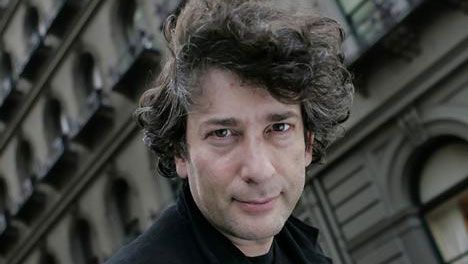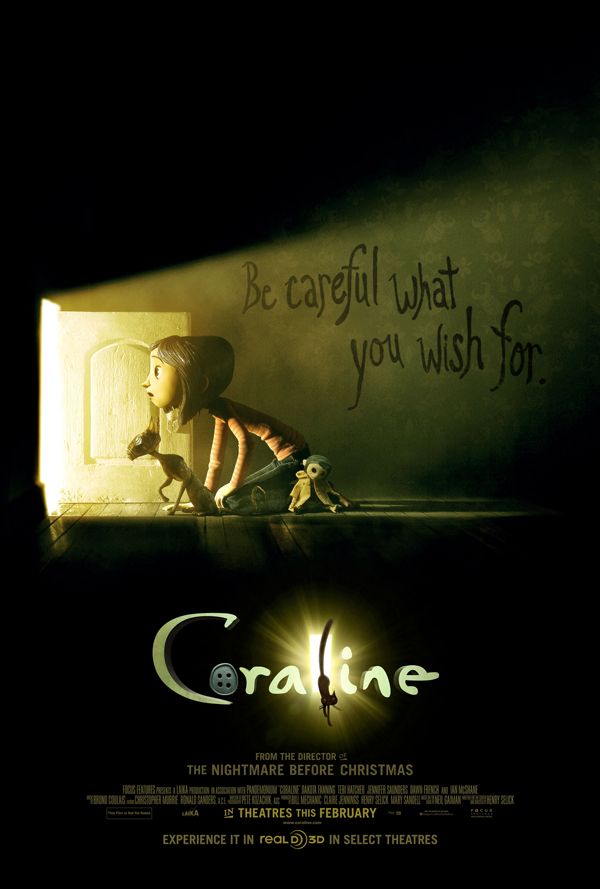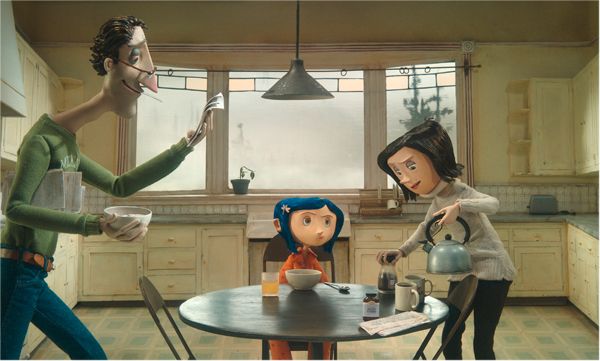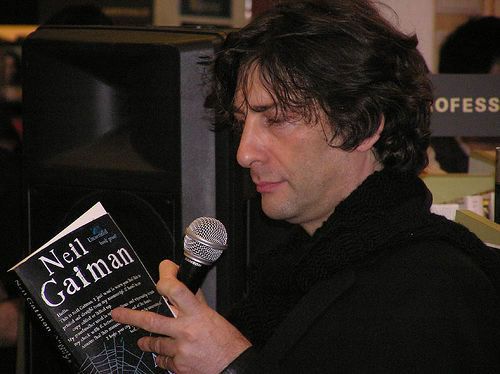I was lucky enough to sit down with one of my idols Neil Gaiman and talk about the making of Coraline, reviews, what might be next, and to hear the status on the long-gestating Death: The High Cost of Living film. If you're a fan of Neil's work, you'll love the interview. Take a look after the jump:
Neil Gaiman starts the conversation talking about some of the figures used in the creation of the movie. A security person had already shooed us reporters. Oddly enough, they also shooed him away as well...
QUESTION: Did they give you one of these?
NEIL GAIMAN: I have a Coraline that looks almost exactly like that. They gave me one of those but she has a satchel that has a little cat in it and her pajamas are ripped and torn and burned. She's from the very end of the film. She sits on my chest of drawers at home and she is incredibly beautiful. I look at it and go "I have a film star there." Occasionally, because I can, I actually pull off her face which I don't think they'd let me do here as I think people would descend in terror. It actually comes off on magnets. It's really kind of cool. They had thousands of faces for her that attach with magnets. They could do these incredible gradual changes in expression one frame at a time.
Q: You create for a living. When you get to see something tactile like this, is that a whole different kind of high?
NG: Guilt. Coraline is almost different because there's such a feeling of joy seeing these things. Going out to the studios, to Laika, being shown around and seeing the incredible amount of work that goes into everything. It's that point where you realize these people are having to be God. If you're a normal filmmaker and you want to film somebody on grass, you simply take them out where there's something grassy and you shoot them. If you need grass in a film like Coraline, you're going to have to make every blade of grass because it doesn't exist until you make it and you're going to have to come up with interesting things that look like grass. If the wind blows you have to move every single one of these little things a frame at a time. We spoke on the panel about the Other Mother. When I wrote the book, all I had to say about the Other Mother towards the end of the story was that she really didn't look like Coraline's mother anymore, but I didn't have to say what she did look like, because I was letting people's imaginations fill in and make it creepier and make it rather odder than I ever could've done. Henry had to make something. What he eventually wound up with was this amazing, terrifying, insectile creature that's just wonderful. The hands made of the needles that I don't dare touch again.
Was there an inciting incident where Coraline came from because the moral seems so strong?
NG: It all originally came from my daughter Holly. Holly is now 24 years old and perfectly normal, probably the most normal person in my family. When she was about 4 years old, her favorite film was Jan Svankmajer's Alice. The stop motion with the Alice in Wonderful where the meat with needles in it gets animated. She used to come home from kindergarten, climb onto my lap and dictate these sort of terrifying horror stories about little girls whose mothers were impersonated by evil witches and would imprison them and then the girls would have to get free and rescue their mothers. I just remember thinking these are such great stories, I will tell her one... actually I first of all I thought I'll buy her one like this and went out to the store and discovered that no one was doing really good Gothic horror for little girls so I started writing one for her. I don't know that there was any moment that I crystallized, "Okay, and then I realized that the theme of the story was how to be brave or whatever..." Coraline took me ten years to write. People now say "Did you know when you were working on it that it would one day become a stop motion film and a graphic novel and an off-Broadway musical?" I wouldn't have taken ten years to write it if I'd known that. I would've hurried a bit.
What does she think of the movie?
NG: She loves it. She really does. I had enormous pleasure taking her. I took my youngest daughter Maddie to see it at the premiere in Portland and then took Holly to see it in London. They loved it.
You had a short story that spoke of a cat defending a family and [in Coraline] you have a cat defending a girl, is this inspired by your own cat?
NG: Actually, the cat in the short story was based very much on a real cat who turned up at our house and he would get into these monstrous battles with things at night and never knew what he fought, all I knew was I had to patch him up in the morning. In Coraline, I think the cat is as much because I really wanted a cat and we were living in a house with a no pets policy and I couldn't have one. Sometimes as a writer it's the things that you can't have and the things that you want that you end up putting in your story. So in the case of Coraline, that's where that came from.
How pleased were you with the reaction to this film, because it seemed to get universally praised?
NG: You know what I loved, not the fact that people loved it, although I loved that people loved it, but I loved how incredibly sensible the reaction to it was. The New York Times review which began "This is a scary film for children and that is a good thing" and then went on to explain why actually doing a scary film for kids is good. Scaring kids in little doses that they can handle is a good thing. I guess coming from England, coming from the British tradition of scaring children, it always seemed to me like a very very sensible thing to do. I loved the English TV series Doctor Who and started watching that age three years old from behind my grandparent's sofa, because I knew if you watched it from behind the sofa, the monsters couldn't come and get you. I love the fact that Coraline exists in that tradition. Yes, it's scary. We make no bones about the fact that it's scary. People asked us who the film is for. Henry and I tried to explain that it's for brave little girls of all ages and genders.
What's the next project that you have that's closest to being realized?
NG: The magic thing about film of course is you genuinely never know. Unless it's something like Coraline... and even Coraline was ten years in that I gave Henry the manuscript in 2000, eighteen months before it was published. I think probably The Graveyard Book is the next thing. Neil Jordan is writing and directing it. The only thing that's frustrating is I don't know that I can say what studio it is with because I know that stuff is being hammered out behind the scenes. It's looking very very good for The Graveyard Book.
What about Death: The High Cost of Living?
NG: I don't know that it's dead right now, but it's definitely lying in a coffin with a lilly on its chest. However anything in comics can come back to life and things in coffins can spring out at you at any moment. I was quite sure in 2002 that Beowulf was not just dead but absolutely gone and dead forever in then in 2004, Bob Zemeckis suddenly resurrected it. Death was meant to have been with New Line and New Line is now basically a filing cabinet in Warner Brothers. If it comes back, or if we can figure out a place within Warner Brothers to make it, then it'll get made. The problem that Death has is that those characters belong to Sandman which belongs to DC Comics which belongs to Warner Brothers which means I can't take anything out. Anything that's mine, I can decide where it goes and what happens to it. I can take a Coraline and I can pick Henry Selick. I can pick who would be the best filmmaker for this -- Henry -- and send, as I did, send the Coraline's manuscript to Henry and then stick with him for seven years while he went off to find a way to make it and a place to make. When he finally found Laika and settled down there and persuaded them to make it, I feel like all of my faith was justified. With Death there's a great script, I would love to make that film someday, but I'm not holding my breath any longer.
How much fun was it to [DC Comic's Batman story] Whatever Happened to the Caped Crusader?
NG: It was a joy. It was a love letter. It was that thing you do where you go, "They've offered me the chance to kill Batman. Not even to kill Batman, to do the last Batman comic." I'm going to do the last Batman comic that I would want to read . Because there's seventy years of Batman, I'm going to put all seventy years of Batman into my comic. I'm going to squeeze it. I'm going to try to put everything in -- all of the films and all of the TV and everything will be in there somehow and that was a joy.



.jpg)


